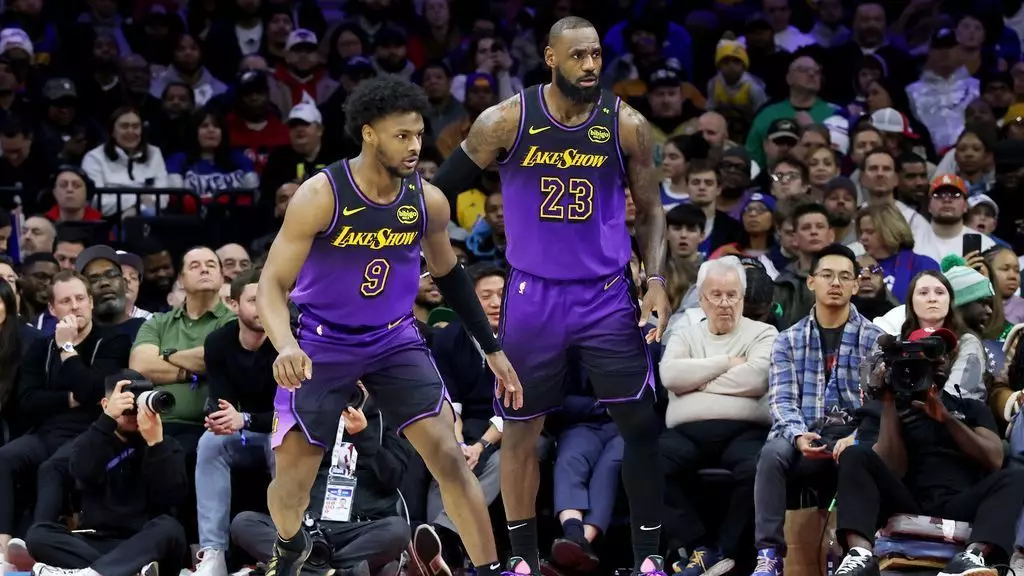In the high-stakes world of professional basketball, situational pressure can heighten the challenges faced by young talents, especially those with the weight of expectations resting on their shoulders. Recently, Los Angeles Lakers coach JJ Redick faced scrutiny for his decision to introduce rookie Bronny James into the game during a critical matchup against the Philadelphia 76ers. The game, marked by a decisive 118-104 loss, served as a reminder of the complexities that accompany such opportunities.
The decision to include James in the rotation can be seen as both a gamble and an act of faith. Redick noted that the match came at a challenging juncture with a five-game road trip and injuries to key players, such as Gabe Vincent. Placing Bronny at the forefront of such a significant game against a nationally ranked team like the 76ers certainly raised eyebrows. Though he had been thriving in the G League with the South Bay Lakers and proving to be a strong performer in those settings, transitioning to the NBA comes with a different level of intensity. The unfortunate reality for James was that his debut was far from stellar, as he finished the night with three turnovers and no points, unable to establish his presence on the court.
It’s impossible to ignore the enormous expectations surrounding Bronny James, the eldest son of NBA superstar LeBron James. His introduction to the league was not merely a function of skill but was underscored by a narrative infused with family legacy and legacy pressures. Coach Redick’s acknowledgment of the unique circumstances surrounding Bronny’s call-up—being thrust into a high-profile game without any meaningful playing time since the opening night—adds layers to both the player’s and coach’s challenges. Redick mentioned that he believed putting Bronny in for energy could benefit the team, yet this idealistic approach seems to have backfired in the face of the game’s realities.
Reflecting on his experience, Bronny spoke candidly about his performance, acknowledging the intensity of matching up against Sixers’ guard Tyrese Maxey, who had an explosive night with 43 points. His thoughtful commentary reflects not only humility but also a willingness to learn. He recognized the need to adapt and grow, summarizing his reactions with the phrase, “I was trying to stand my ground.” This growth mindset indicates Bronny’s understanding that each opportunity, successful or not, is a building block in his developmental journey.
While it’s easy to dwell on the mistakes made during the game, Bronny’s perspective shifted toward the future when he noted that he feels “a whole lot more prepared” than during his initial appearances. This self-awareness suggests a maturity beyond his years, highlighting that he understands the necessity of preparation even when facing setbacks. Continuous learning is vital, particularly in a sport as complex and fast-paced as basketball.
LeBron James, a seasoned athlete, shared his insights on his son’s growth, recognizing that such experiences are essential for Bronny’s development as a player. The elder James was there for both of his son’s moments—his debut alongside him and now as he navigates the harder aspects of professional basketball. LeBron’s belief that Bronny’s prospects will improve as he garners more playing time aligns with the general sentiment that persistence and resilience are key to succeeding in the league.
In the face of mixed results, it’s clear that Bronny James has the potential to evolve. The learning curve in the NBA is notoriously steep, particularly for players thrust into challenging situations. The juxtaposition of pressure, desire, and the pursuit of growth will undoubtedly shape not just Bronny’s career but also the narratives that will surround him as he continues to carve out his own identity in the sport. Thus, while the 118-104 loss against the 76ers was undoubtedly a setback, it also serves as a moment in time—a stepping stone in a much larger journey for a young player destined to establish his path in the shadow of a legendary father.

